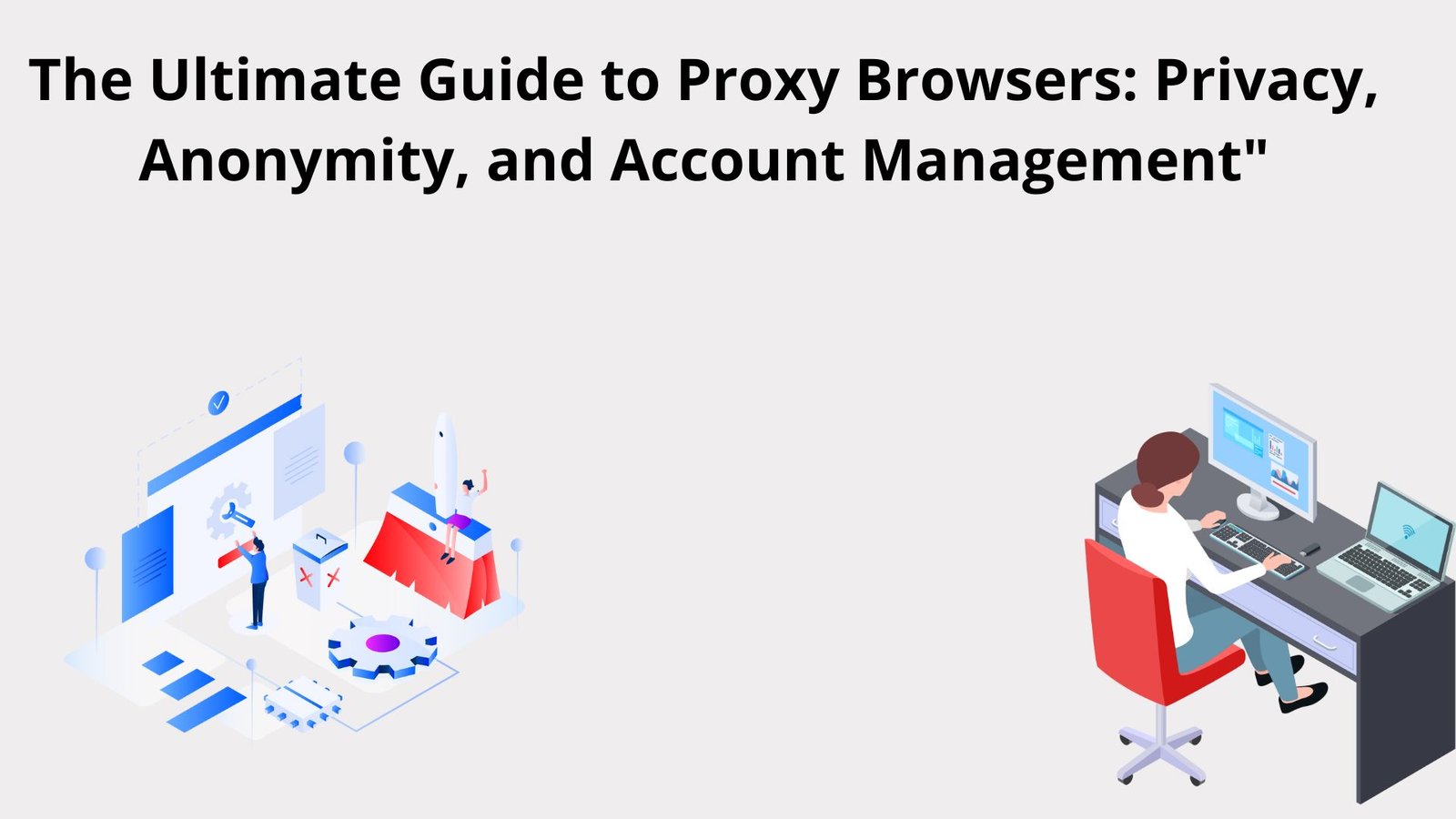In today’s digital age, maintaining online privacy and security is more important than ever. Proxy browsers have emerged as crucial tools for safeguarding personal data and allowing users to manage multiple online identities without revealing sensitive information. Leading solutions such as GoLogin, Multilogin, and AdsPower offer users the ability to operate multiple profiles with distinct fingerprints and IP addresses, enhancing anonymity and helping avoid detection while browsing.
Whether you’re engaged in affiliate marketing, social media management, or simply looking to protect your online presence, choosing the right proxy browser is key. These tools ensure your digital activities remain safe and private, allowing you to access restricted content and bypass geo-blocks.
What Are Proxy Browsers, and How Do They Differ from VPNs?
Proxy browsers work by routing your internet traffic through proxy servers, masking your real IP address and providing anonymity while you browse. When using a proxy browser, your requests appear to come from the proxy server rather than your actual location, making it possible to bypass regional restrictions and access blocked content.
While both VPNs and proxy browsers can hide your IP address and bypass geo-restrictions, the main difference lies in their security features. VPNs encrypt all your internet traffic, providing a higher level of security, which is essential for sensitive activities like online banking or accessing private information. In contrast, proxy browsers generally do not encrypt traffic, which means they are useful for basic anonymity but may not protect your data from being intercepted.
Proxy browsers are ideal for users who need to access geo-restricted content, manage multiple accounts, or perform web scraping without revealing their true location. However, if data security is a top concern, a VPN might be a more appropriate choice.
Key Use Cases for Proxy Browsers
Proxy browsers serve multiple functions, especially in scenarios where maintaining separate online identities or bypassing content restrictions is crucial. Below are some common use cases:
1. Bypassing Geo-Blocking
Proxy browsers are commonly used to bypass geographic restrictions placed on websites or streaming services. By routing your traffic through servers located in regions where content is accessible, users can access media or websites that are otherwise blocked in their location. This is especially useful for travelers or individuals living in areas with strict internet censorship.
2. Accessing Blocked Sites
In regions where certain websites are blocked or restricted for political or cultural reasons, proxy browsers offer a way around these limitations. By masking the user’s real IP, they can access information or services that are otherwise unavailable in their area, crucial for journalists, activists, or anyone needing uncensored access to the internet.
3. Managing Multiple Accounts
Proxy browsers are invaluable for managing multiple online profiles or accounts. Whether it’s for social media management, digital marketing, or affiliate campaigns, these browsers allow users to maintain several accounts on the same platform without triggering suspicions from the website. Each profile is assigned a unique digital fingerprint, making it appear as if they are operated by different individuals.
Advantages and Disadvantages of Proxy Browsers
Advantages:
- Privacy and Anonymity: Proxy browsers help conceal your IP address, offering a layer of privacy while browsing.
- Access to Restricted Content: They allow users to bypass geo-blocks and access content otherwise unavailable in their region.
- Multiple Account Management: Proxy browsers enable users to run multiple accounts without raising suspicion or risking account suspension.
Disadvantages:
- No Data Encryption: Unlike VPNs, proxy browsers generally do not encrypt your internet traffic, making them less secure.
- Detection Risks: Some websites may still detect the use of proxies and block access, especially if they notice suspicious behavior.
- Speed Issues: Depending on the quality of the proxy server, users might experience slower speeds or higher latency.
Best Proxy Browsers in 2025
Here’s a list of the top-rated proxy browsers that stand out for their reliability, performance, and ease of use:
1. GoLogin
GoLogin is a versatile antidetect browser designed for managing multiple online identities with ease. It’s suitable for personal use as well as for businesses, offering a range of pricing plans and proxy options.
Pricing Plans:
- Free Plan: Includes 3 profiles with free proxies.
- Professional Plan: $49/month for 100 profiles.
- Business Plan: $99/month for 300 profiles.
- Enterprise Plan: $199/month for 1,000 profiles.
- Custom Plan: For large organizations needing up to 40,000 profiles.
GoLogin is perfect for marketers and businesses that need to manage many profiles, with features like built-in proxies, customizable browser settings, and cross-platform support.
2. Multilogin
Multilogin allows users to handle multiple profiles across different platforms without risking detection. It’s designed for businesses and marketers who need to keep their online identities secure.
Pricing Plans:
- Free Basic Plan: 3 profiles, no proxies.
- Starter Plan: €29/month for 10 profiles, 1GB proxy traffic.
- Solo Plan: €79/month for 100 cloud profiles, 5GB proxy traffic.
- Team Plan: €159/month for 300 profiles, 10GB proxy traffic.
Multilogin offers native proxy integration and is compatible with Windows, Linux, and Mac, making it ideal for teams who need to maintain several online identities simultaneously.
3. AdsPower
AdsPower is an antidetect browser designed for managing several online accounts without triggering tracking or bans. It is particularly useful for affiliate marketers, e-commerce businesses, and web scrapers.
Pricing Plans:
- Free Plan: 5 profiles.
- Custom Plan: Starts at $9/month for 10-1,000 profiles.
AdsPower’s unique features, like custom user agents and IP addresses for each profile, make it an excellent choice for businesses focused on online marketing and secure data scraping.
4. Dolphin Anty
Dolphin Anty is a specialized antidetect browser built for affiliate marketers, offering strong fingerprint management features.
Pricing Plans:
- Free Plan: 10 profiles.
- Base Plan: $89/month for 100 profiles.
- Team Plan: $159/month for 300 profiles.
- Enterprise Plan: $299/month for 1,000 profiles.
This browser allows users to buy proxies directly within the app, making it easier to manage online activities and maintain anonymity.
5. 1Browser
1Browser offers a simple and free solution for users needing to maintain multiple profiles without the complexity of other tools. It closely mimics Google Chrome for a familiar browsing experience.
Pricing:
- Free: The browser is free, but users can purchase additional proxy services.
1Browser provides a smooth learning curve for beginners and includes built-in proxies for easy profile management.
Conclusion
Choosing the best proxy browser largely depends on your needs—whether you’re looking for a cost-effective solution for basic browsing or a robust tool for managing numerous identities and avoiding detection. GoLogin, Multilogin, and AdsPower stand out as the top options for businesses and individuals who require security, flexibility, and reliability in their online activities. By evaluating the features, pricing, and customer support of each option, users can confidently select the best proxy solution for their online privacy and security.




